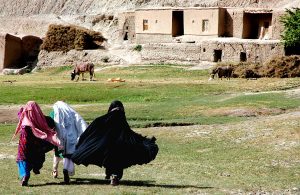Recently, the Taliban in Afghanistan forbade Afghan women from praying loudly or reciting the Quran in front of other women, following the introduction of terrifying yet unsurprising new “vice and virtue” laws requiring women to cover their entire bodies, including their faces, whenever they are in public. The Taliban claim that women’s voices alone could inspire men and grown women to sin. So, the Taliban also decreed that women should not speak, sing, or recite anything aloud in public.
Afghan women feel that the world has turned a blind eye as the Taliban have gradually reduced them to prisoners in their own homes.
Many diplomats and foreign analysts speculated that the Taliban would soften their harsh rule in exchange for aid and international recognition. We Afghan women knew better. Many of us warned the world that withholding recognition alone is not enough to change the Taliban’s policies on women. The new laws clearly demonstrate the Taliban’s intent to establish a gender apartheid, a society in which the regime systematically segregates and excludes women from public life.
I was born in Herat, a city in Afghanistan known for its art and poetry. I spent my childhood as a refugee in Iran, a country known for restricting women’s freedom, but it was still far better than the harsh Taliban rule of the 1990s. When I returned to Afghanistan as a young woman after the U.S. invasion, I had no prior experience of freedom. I worked as a teacher and community organizer, traveling across 27 provinces. I had the right to stand up against male family members in a court of law, a first in my family.
The tangible changes brought about by U.S. engagement in Afghanistan were evident in every province I visited and in the lives of women there. While many women remained trapped by cultural norms, for the first time in decades, we could imagine a different future.
That hope was shattered three years ago when everything we’d gained vanished overnight.
I am part of a campaign, End Gender Apartheid, supported by hundreds of prominent jurists, public figures, academics, civil society leaders, and activists. The campaign aims to include gender apartheid in the U.N.’s crimes against humanity treaty and to ensure international leaders call the Taliban’s actions what they are. This initiative emerged from the collective frustration of Afghan women and allies worldwide, recognizing that without explicit legal recognition of these atrocities, accountability would remain elusive. Our goal is to build a robust coalition that pressures governments and international bodies to act decisively in defense of Afghan women.
What Afghan women face is not just misogyny. It is systematic oppression from the top down – a characteristic of apartheid – that goes beyond the inequalities most societies are still striving to overcome. By establishing a gender apartheid regime, the Taliban’s actions meet the legal criteria for crimes against humanity: a widespread and systematic attack directed against a civilian population with intent to marginalize and exclude a group (in this case, women) entirely from society. This legal framing aligns with precedents set by international law, ensuring that such actions are condemned and punished appropriately.
This isn’t just theory or academic talk; it’s the real, ongoing oppression of women happening right now in our lifetime. We are recording all the decrees and restrictions that the Taliban are imposing on women and making this information accessible to advocates and human rights defenders worldwide. We have trained hundreds of Afghan advocates and civil society leaders on the legal and technical aspects of the campaign. This work is being done in our personal capacities, not as a formal job that pays the bills. It is the most grassroots campaign I have ever seen among Afghans.
Some may question why terminology matters. What leaders call the situation in Afghanistan won’t instantly change the reality for women there. Even with labeling the Taliban’s actions as a crime against humanity, the international community won’t enforce rights in a country they’ve abandoned. But calling oppression what it is is the first step to resisting it. Real change can’t occur in a fog of denial and disinformation. Afghan women can’t speak their truth, so we must do it for them.
This is personal to us. Today, many women across the world live better lives than their mothers and grandmothers. Women in many places are often financially independent and have the freedom to make their own choices regarding romance and reproduction, freeing them from dependence on men. In more traditional societies, women still face some restrictions, but they still enjoy far more freedoms than their grandmothers could have imagined. This trend holds true almost everywhere – except for Afghan women. My generation was supposed to experience something different. Instead, we’ve traveled backward in time.
Today, I still have a better life than my mother and grandmother, but this privilege came at the cost of leaving Afghanistan and becoming an American. Afghan women in the diaspora often experience a form of “survivor’s guilt” for the women we left behind, and so we have no choice but to be their voice in the face of an indifferent world.
What we want is for the cruelty being endured by women and girls in Afghanistan to be called what it actually is: gender apartheid, and a crime against humanity.

































